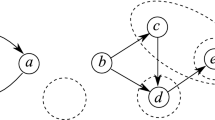Abstract
OLDTNF resolution is an important mechanism used in a Prolog interpreter. This mechanism is extended and improved for evaluating recursive queries in deductive databases. The key idea of the refinement is to distinguish between two classes of lookup nodes in an OLDTNF derivation and to handle them differently. First, reduce the search space by cutting of any subtree rooted at a lookup node of the first class. Further, speed up the evaluation by processing the second class in a second phase and generate many solutions directly from the solutions already produced (and the corresponding keys of solution lists) instead of evaluating them by expanding the corresponding subtrees in terms of the new solutions stored in solution lists.
Similar content being viewed by others
References
Lloyd, J. W.,Foundations of Logic Programming, Berlin: Springer-Verlag, 1987.
Tamaki, H., Sato, T., OLD resolution with tabulation, inProc. 3rd Inter. Conf. Logic Programming, Cambridge, London: MIT Press, 1986, 84–98.
Vieille, L., From QSQ to QoSaQ: Global optimization of recursive queries, inProc. 2nd Int. Conf. Expert Database System (ed. Kerschberg, L.), Charleston, 1988, 743–748.
Seki, H., Itoh, H., A query evaluation method for stratified programs under the extended CWA, inProc. Inter. Conf Logic Programming, Cambridge, London: MIT Press, 1989, 195–211.
Balbin, G. S., Ramamobanarao, P. K., Menakshi, K., Efficient bottom-up computation of queries on stratified databases,J. Logic Programming, Amsterdam: Elsevier Science Inc., North-Holland, 1991, November, 295–344.
Chen, Y., Magic sets and stratified databases,Int. J. Intelligent Systems, New York: John Wiley & Sons Inc., 1997, 12 (3): 203.
Ullman, J., Van Gelder, A., Parallel complexity of logic programs,Algorithmica, Berlin: Springer-Verlag, 1988, 5–12.
Vardi, M. Y., The complexity of relational query language,in Proc. 14th Annual ACM Symp. Theory of Computing, San Francisco, Calif., May 5–7, 1982, New York: ACM, 1982, 137–146.
Aho, A. V., Sagiv, Y., Ullman J. D., Efficient optimization of a class of relational expression,ACM Trans. Datab. Syst. 4: 4 (Dec. 1979), New York, 1979, 435–454.
Gaifman, H., Mairson, H., Sagiv, Y. et al. Undecidable optimization problems for database logic programs,J. ACM, 1993, 40(3): 683.
Clark, K. L., Negation as failure, inLogic and Databases (eds. Gallaire, H., Minker, J.), New York: Plenum, 1978, 293–322.
Van Gelder, A., A message passing framework for logic query evaluation, inProc. 1986 CMSIGMOD Conf. on Management of Data, New York, ACM, 1986, 155–165.
Cousot, P., Cousot, R., Abstract interpretation frameworks,J. Logic Programming, Amsterdam: Elsevier Science Inc., 1992, 2: 511.
Kanamori, T., Kawamura, T., Abstract interpretation based on OLDT resolution,J. Logic Programming, Amsterdam: Elsevier Science Inc., 1993, 15: 1.
Tarjan, R., Depth-first search and linear graph algorithms,SIAM J. Compt., 1972, 1(2): 146.
Author information
Authors and Affiliations
Rights and permissions
About this article
Cite this article
Chen, Y. OLDTNF-based evaluation method for handling recursive queries in deductive databases. Sci. China Ser. E-Technol. Sci. 41, 561–578 (1998). https://doi.org/10.1007/BF02917039
Received:
Issue Date:
DOI: https://doi.org/10.1007/BF02917039




